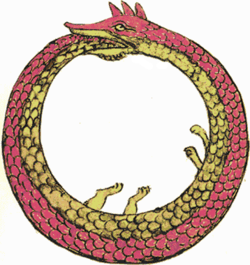Top Qs
Timeline
Chat
Perspective
Eternity
Endless time or timelessness From Wikipedia, the free encyclopedia
Remove ads
Eternity, also forever,[a] in common parlance, is an infinite amount of time that never ends or the quality, condition or fact of being everlasting or eternal.[1] Classical philosophy, however, defines eternity as what is timeless or exists outside time, whereas sempiternity corresponds to infinite duration.
Remove ads
Philosophy
Summarize
Perspective
Classical period (8th-7th century BC[b] - 5th-9th century AD)[c] Plato (c. 428–423 BC - 348/347 BC) described time as the moving image of eternity in Timaeus (37[8] D[9]). Aristotle (384–322 BC) suggested the celestial realm was eternal (in Book I of On the Heavens)[10] and an eternal world (in Physics)[11] in regard to both past and future eternal duration. The thought of Classical period Augustine, as exists in Book XI of the Confessions, and Boethius (c. 480–524 AD), in Book V of the Consolation of Philosophy were adopted as the reality of the subject for later thinkers in the western tradition of philosophy and in theology.[12] Classical philosophy defines eternity as what exists outside time, as in describing timeless supernatural beings and forces, distinguished from sempiternity which corresponds to infinite time, as described in requiem prayers for the dead.[which?] Boethius defined eternity as "simultaneously full and perfect possession of interminable life".[13][d]
Thomas Aquinas (c. 1225 – 1274) believed in an eternal God, without either a beginning or end; the concept of eternity is of divine simplicity, thus incapable of being defined or fully understood by humankind.[14] Thomas Hobbes (1588–1679) and many others in the Age of Enlightenment drew on the classical distinction to put forward metaphysical hypotheses such as "eternity is a permanent now".[15]
Contemporary philosophy and physics
Today cosmologists, philosophers, and others look towards analyses of the concept from across cultures and history. They debate, among other things, whether an absolute concept of eternity has real application for fundamental laws of physics; compare the issue of entropy as an arrow of time.
Remove ads
Religion
Eternity as infinite duration is an important concept in many lives and religions. God or gods are often said to endure eternally, or exist for all time, forever, without beginning or end. Religious views of an afterlife may speak of it in terms of eternity or eternal life.[e] Christian theologians may regard immutability, like the eternal Platonic forms, as essential to eternity.[16][f]
Remove ads
Symbolism
Eternity is often symbolized by the endless snake, swallowing its own tail, the ouroboros. The circle, band, or ring is also commonly used as a symbol for eternity, as is the mathematical symbol of infinity, . Symbolically these are reminders that eternity has no beginning or end.
- The ouroboros
- The "endless knot," a symbol of eternity used in Tibetan Buddhism.
- Infinity symbol variations
- Jacopo da Sellaio, Triumph of Eternity, 1485–1490
See also
Notes
- in the context of future only - also everlasting
- Termination of the classical era considered: the last Western Roman Emperor (476),[4][5] the last Platonic Academy in Athens ends (529) [6] the Muslim conquest of the Maghreb, Near East and Europe; 637 - 870 [7]
- Boethius (523), book 5, prose §. 6, quote: "Aeternitas igitur est interminabilis vitae tota simul et perfecta possessio."
- For examples: Bassali (2008), p. 138, quote: "In the next life, there will be two places only - heaven and hell. ... In heaven, you will spend an eternity of bliss, light, and glory with God. In hell, you will spend an eternity of woe, darkness and torment apart from God. Which of these two places would you prefer to spend your eternity?"
- Deng (2018), quote: "Augustine connects God's timeless eternity to God's being the cause of all times and God's immutability."
Remove ads
References
Further reading
External links
Wikiwand - on
Seamless Wikipedia browsing. On steroids.
Remove ads







